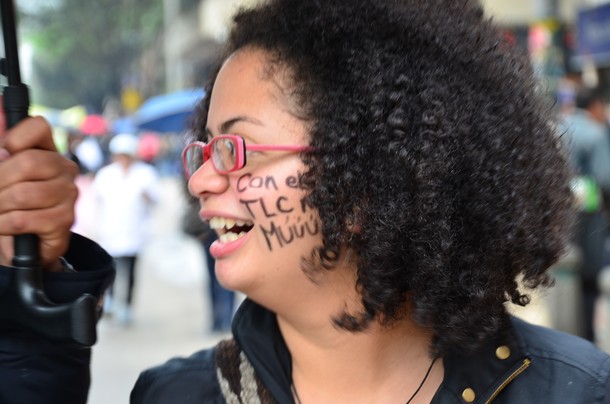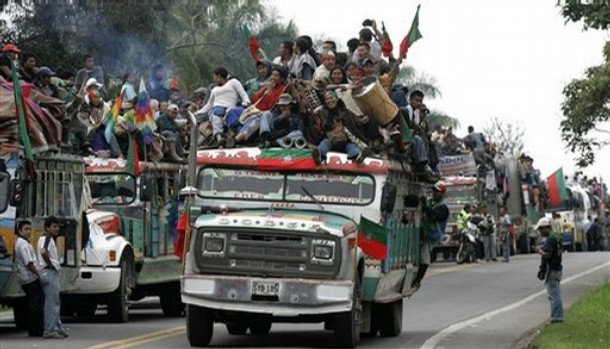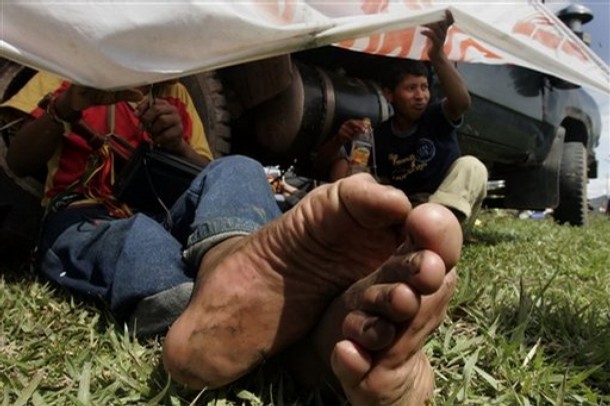FTA with Colombia favors companies over Colombians
Znet | 18 November 2008
FTA with Colombia Favors Companies over Colombians
The Free Trade Agreement would exacerbate an already grave humanitarian crisis
By Charles Mostoller

The U.S. Free Trade Agreement (FTA) with Colombia is back in the spotlight, after President Bush allegedly conditioned his support for a bailout of the auto industry on the Democrats dropping their opposition to the FTA.
For months, the FTA has been tied up in Congress due to concerns over Colombia’s atrocious human rights record. Until now, the debate has centered on the many deaths suffered by labor leaders at the hands of government and paramilitary forces.
At the behest of U.S. organized labor, President-elect Barack Obama, during his Presidential campaign, repeatedly denounced the FTA suggesting that it would increase violence against Colombian labor activists.
Yet President Bush refuses to give up, despite a Colombian nationwide referendum on the FTA in 2005 that 98% of Colombians voted against.
Not surprisingly, The Wall Street Journal concurs with Bush policy by asserting that Obama does not understand the benefits of “Free Trade”.
The renewed interest in passage of the FTA in the U.S. comes at a pivotal moment in Colombia.
Right now, thousands of indigenous protestors, union activists and leaders of the peasant movement are marching from the south of the country to the capital city of Bogota, to protest the neo-liberal economic policies of Colombian President Alvaro Uribe-Bush’s main ally in the region.
A confrontation between the indigenous protestors and government forces exploded a month ago, when soldiers opened fire on thousands of demonstrators in northern Cauca, injuring dozens of civilians. At least four people were killed.
Two weeks ago, the head of the Colombian Armed Forces, General Mario Montoya and 26 other high-ranking officers were forced to resign. The officers had been linked to a military practice known as ‘false-positives,’ where poor city youth are detained, taken to into the jungle, shot, and then dressed in camouflage to be presented as leftist FARC rebels killed in combat.
Complicating the situation, Uribe’s government is mired in scandal. Many legislators in his party are in jail or under prosecution for ties to paramilitaries, death squads, and drug cartels.
Shortly before the U.S. Presidential election, Uribe sat down to negotiate with the indigenous movement, but after hours of debate, he rejected all of the movement’s demands.
Faced with Uribe’s rebuff, on November 10th, the Association of Indigenous Councils of Northern Cauca (ACIN) sent an open letter to Obama, asking him not to support the Free Trade Agreement with Colombia.
In turn, the Uribe government has accused the indigenous groups of helping the FARC to plant a bomb that killed two soldiers late in the day on Tuesday, a charge that the indigenous movement adamantly denies.
Manuel Rozental, a spokesperson for the ACIN, said that the government wants to criminalize the indigenous movement in order win public support for its ongoing campaign of violence against their peaceful mobilization, known as the minga in Colombia.
“The indigenous movement has made a very clear statement against war and against all warring factions, including the armed insurgency,” he said.
“It only provides the government the argument to move in and attack civilians and then blame them as being terrorists,” he continued. “Taking arms to resist an aggressive regime would be to transform oneself into the same entity that one is opposing.”
The primary demand of the movement is an end to the neo-liberal economic policies promoted by Uribe and to the brutal security measures employed under the US-backed Plan Colombia.

For Colombia’s indigenous peoples, the government’s combined economic and security policies have only resulted in poverty and violent dispossession from their land.
Although little discussed, Colombia has more than four million internally displaced peoples, second only in magnitude to the crisis in Darfur.
According to Rozental, transnational mining and natural gas companies are behind the forced displacement of indigenous peoples from resource rich areas.
“Without the constant terror from the government, it would be impossible to deliver the resources and territories of the country to transnational corporations,” he said.
“Four million people have been displaced from resource rich territories,” he continued, “in order to deliver those territories to corporate interests. If the FTA gets signed, the appropriation of resources and lands can be legalized by an apparently democratically elected body of legislators, who, in fact, got into office through the support of death squads.”
However, The Wall Street Journal, in an editorial attacking Obama’s stance on the FTA, seemingly overlooked the Colombia’s widespread corruption and supported its violent security forces and Uribe’s disastrous economic policy.
“If Colombia hopes to keep spending on judicial improvements and better law enforcement, it needs an expanding economy”, said the editorial. “Since Uribe took office in 2002, violence has been substantially reduced. Mr. Obama has never explained how denying Colombians the FTA will help the country reduce violence. Maybe this is because he knows he’s merely repeating union distortions.”
Yet several international human rights organizations have also denounced the ongoing use of violence against Colombians by international companies.
According to MiningWatch Canada, “Where corporations have sought access to Colombia’s resources — oil, coal, gold, emeralds — they have used paramilitary violence, forced displacement, massacres, and disappearance as tactics to remove populations and secure their investments.”
Despite ongoing violent attacks, the indigenous people in the Cauca have for decades refused to be displaced, in what has become a courageous example for other Colombians to follow.
“They’ve become the center of civil resistance in the country,” said Rozental. “They will face armed attacks by going out, unmasked, to face those who are attacking them.
“The indigenous movement has shown that it is the only one that has been able to face the Uribe regime, against the terror and fear, and has actually managed to push away all warring factions,” he continued.
For this, they have twice won the Colombian Award for Peace. According to Rozental, Colombia’s indigenous peoples have a sacred responsibility to protect life and the land.
“Indigenous people have one sacred ancestral position : the defense and promotion of life, above anything else,” he said. “They resist the global neoliberal regime that has made wealth sacred precisely because life has to be protected and this system is destroying it.”

Yet on Friday, the march towards Bogota was again met with a heavy police and military detachment, which refused them entry to the city of Ibague.
Rozental said that many of the movement’s leaders fear more violence as the mobilization approaches Bogota.
“It’s our greatest fear,” he said. “We fear that it is to the advantage of the regime that actions of war and terror take place during the minga. The only beneficiaries of violence, at this stage, are the regime itself and its transnational allies.”
“We are calling upon the world to protect the people of Colombia against the greatest risk and danger we’re facing : the government of Colombia.”
But Rozental is quick to point out that all of the actions taken by the Colombian government are backed by the US and Canadian governments, as well as transnational companies. Whether directly or indirectly linked to the rampant human rights abuses ongoing in Colombia, he believes they, too, should be held accountable.
“They know they are negotiating and signing an agreement in order to access wealth, cheaply, through the constant and systematic use of terror,” he said.
“And the outcome of all this,” he continued, “is that the people are massively displaced from their land.”
In a press release outlining their opposition to the FTA, the ACIN made clear that they fear the passage of the FTA will only facilitate further violence and human rights abuses.
“We are not against international trade and economic relationships. But a basic condition to approve any trade agreement should be the respect of fundamental human rights, and this FTA subordinates our collective and individual human rights to the interests of investors.”





